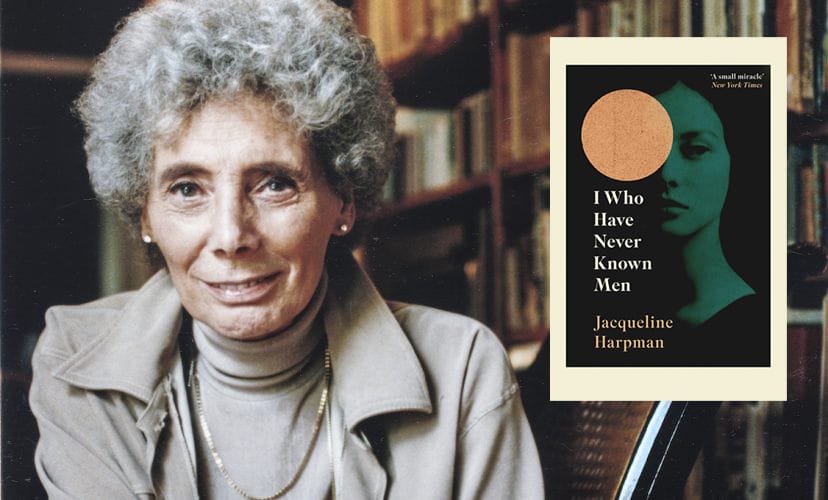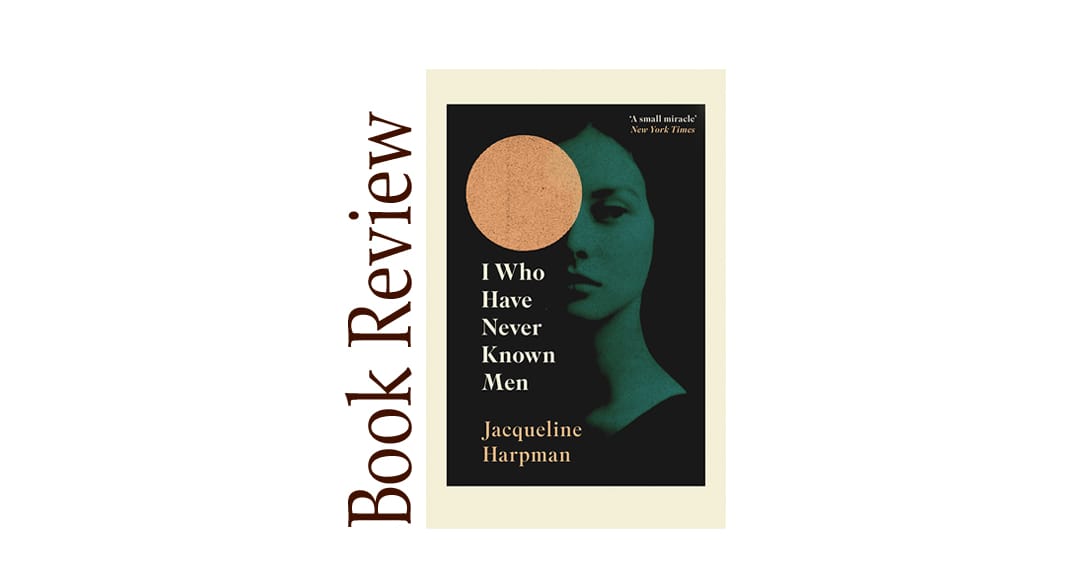- Date Published:
1995 - Length:
208 pages—Listening Time: 6 hr 46 minutes - Genre:
Fiction, Dystopian, Science Fiction - Setting:
Post-apocalyptic, exact time is vague; near-future dystopian world - Awards:
Prix Femina Award Finalist, 1995 - Languages:
Catalan, Dutch, English, French, Italian, Latin, Lithuanian, Spanish, Swedish, Portuguese (Portugal) - Sensitive Aspects:
Imprisonment, captivity, death, suicide, systemic violence, sexism, misogyny, child abuse, child endangerment, classism - Movie:
There are no movies or movie deals currently known about this book. - Recommended for Book Club:
Yes. I wish I could be present for every book club that discusses this book because every one will be different.

Some books linger in the mind long after the last page is turned, and I Who Have Never Known Men by Jacqueline Harpman is one of those rare, haunting reads that refuses to fade into the background, even for someone who wouldn’t exactly consider themselves a die-hard dystopian fan. Admittedly, dystopian literature isn’t my usual genre of choice; I gravitate toward novels grounded in history or realism, tales that anchor themselves in the routines and complexities of everyday living. Yet, this novel drew me in with an intensity that still amazes me. I finished it, not entirely sure what I had experienced, but absolutely certain I would never forget it.
From the start, Harpman’s story carved out its own territory in my reading life. It’s a book that defies easy description or tidy categorization, and that uncertainty is precisely what makes it so mesmerizing. One could argue endlessly about what it “means.” Is it a meditation on loneliness, memory, humanity, or something deeper and stranger? Each reader will likely walk away with a different answer, and as someone who loves a good book club debate, I’m looking forward to discussing all the possible interpretations with fellow readers. The ambiguity at the heart of the novel is not a flaw; it’s an invitation.
Reading Harpman’s work compelled me to seek out more information about the author herself. Who is the mind behind a narrative so spare and unsettling, yet so powerfully immersive? Harpman was born in Belgium. Her father was a Dutch-born Jew, and the family fled to Casablanca after the Nazis occupied Belgium during WWII. They returned to Belgium following the war. After studying French literature at the University of Brussels, she began training to be a physician but was unable to complete her studies due to TB. In 1980, she became a psychoanalyst. The woman, along with this book, is brilliant.
There’s not much I want to reveal about the plot, for fear of disrupting the spell for another reader. This is a book that benefits from going in relatively blind, letting the story’s atmosphere and sense of mystery work on you directly. Instead, I’ll simply say that Harpman’s enigmatic creation left me with more questions than answers, and a lingering fascination with the kind of imagination capable of conjuring such a world.
In short, I Who Have Never Known Men is not easily summarized, nor can it be quickly digested, but it is unforgettable. Whether you typically enjoy dystopian tales or not, this novel is one to approach with curiosity and an open mind. It’s a testament to writing that invites rather than instructs, and it’s the kind of book that will echo in your thoughts long after you set it down.

I Who Have Never Known Men by Jacqueline Harpman is a post-apocalyptic, existential novel whose summary must remain intentionally sparse to preserve the haunting experience for future readers. The story unfolds through the eyes of an unnamed young narrator, the youngest among a group of forty women imprisoned deep underground. Watched by silent, armed guards, the women grasp only shadowy fragments of their past lives, and they do not know why they have been confined in this subterranean cage. Their existence is defined by monotony, deprivation, and a relentless sense of uncertainty; a world “outside” is referred to, but whether it remains habitable or even familiar is unknown.
What sets the narrator apart is that she has only ever known life inside the cage. Unlike the others, whose memories are faded, she remembers nothing but captivity, and her early years isolate her emotionally from the rest. Yet it’s her curiosity and growing self-awareness that gradually ignite changes among the group. Mentored by Anthea, one of the older prisoners, the narrator’s quest for knowledge shifts the interior dynamics, leading some women to question their situation and cling to fragments of hope.
Everything changes suddenly when the guards mysteriously vanish, triggered by a siren. The narrator leads the escape, and the women emerge into a barren, unfamiliar landscape. Above ground, their hopes of reunion or rescue dissolve quickly—they seem to be the only survivors in the world, and answers to their questions remain elusive. Their journey through empty plains and silent bunkers offers no confirmation of where they are or what has happened, only a deepening sense of existential reckoning. Their lives become a struggle for basic survival and meaning, forced to confront isolation, mortality and loss, and the limits of what it means to be human in the absence of society.
Harpman's prose is stark, and the world she creates is both surreal and unsettling. The narrator’s voice reflects aching vulnerability and resilience, and the novel’s atmosphere is one of unrelenting ambiguity: no easy answers about the disaster, the women’s fate, or the world itself are ever provided. In keeping with the spirit of Harpman’s storytelling, this summary is intentionally spare: to read I Who Have Never Known Men is to surrender to its mysteries and endure its philosophical weight firsthand, and disclosing more would only diminish the experience.

Readers with Wrinkles subscribers will find Jacqueline Harpman’s I Who Have Never Known Men a haunting and thought-provoking choice, especially for those who appreciate complex, mature themes and philosophical exploration. Below are the top reasons this book stands out for seasoned readers.
Exploration of Solitude and Survival
The novel plunges readers into a world defined by loneliness, endurance, and the struggle to find meaning in isolation. It asks what it means to survive when hope and knowledge of “before” are stripped away.
Philosophical Depth and Identity
Readers keen on literary and existential questions will find rich material in the narrator’s musings about identity, memory, and how to forge a sense of self with almost no context or personal history. The book probes what truly makes us human when culture and society fall away.
Unique Perspective on Womanhood and Community
The absence of men among the prisoners reshapes the idea of womanhood, friendship, and intimacy. Readers are invited to reflect on how gender roles and bonds are constructed—and deconstructed—in extreme circumstances.
Ambiguity and Open Interpretation
For seasoned readers, the book’s refusal to “tie things up neatly” offers space for deep interpretation and re-reading. The ambiguity surrounding the setting, plot details, and even genre elevates the reading experience to something personal and meditative.
Themes of Aging and Loss
The story tracks the women’s journey into old age under unthinkable conditions. Their experience resonates with mature readers who have lived through loss, change, and the challenge of finding purpose at different life stages.
Provocative Questions About Humanity
Through its minimalist but intense narrative, Harpman’s work confronts what remains of the human spirit in the face of absurdity, deprivation, and uncertainty. Mature readers especially will appreciate the narrative’s demand to wrestle with discomfort and existential questions.
A Book That Stays With You
This novel leaves a lingering emotional imprint, haunting readers with its silence, unanswered questions, and the deep grief and love that exist even in places where hope is barely visible. It’s the kind of book that can provoke book club debates and personal reflection long after the last page.
A Literary and Cultural Artifact
Originally written by a Belgian author shaped by the shadows of World War II, the book also serves as an allegory of trauma, persecution, and historical violence, offering mature readers additional layers of meaning to unravel.


Get Jacqueline Harpman Books
Jacqueline Harpman's novels offer haunting explorations of survival, identity, and female community, combining exquisite prose and psychological insight to create unforgettable dystopian and gender-bending tales for lovers of thought-provoking literary fiction.

Here is a list of recommended books similar to I Who Have Never Known Men, each accompanied by a brief description highlighting its thematic resonance or emotional impact :
- The Memory Police by Yoko Ogawa
On an isolated island, objects (and memories of them) mysteriously vanish, enforced by a ruthless police force. The novel is a haunting meditation on loss, identity, and authoritarian control, with a quietly unsettling, surreal atmosphere. - The Wall by Marlen Haushofer
A woman awakens to find herself inexplicably cut off from the world by a transparent wall, forced to survive completely alone. Haushofer’s introspective narrative dwells on isolation, daily survival, and philosophical questions about existence and selfhood. - A Short Stay in Hell by Steven L. Peck
After death, a man is sent to a personalized version of Hell inspired by Borges’ Library of Babel, tasked with finding the book of his own life among infinite volumes. This philosophical novella probes themes of eternity, adaptation, and existential suffering. - Station Eleven by Emily St. John Mandel
Following a pandemic-induced societal collapse, survivors struggle to rebuild and find meaning, centering around a traveling troupe of actors performing Shakespeare. The book combines emotional introspection and speculative fiction, exploring what remains of culture and humanity after disaster. - The Left Hand of Darkness by Ursula K. Le Guin
Set on a distant planet with an ambisexual society, an ambassador must navigate cultural differences and existential challenges. Le Guin’s masterpiece is both a profound study of gender, identity, and isolation, and a mesmerizing speculative journey. - The Water Cure by Sophie Mackintosh
Three sisters are raised in isolation, conditioned to fear the outside world and men, in an atmospheric tale of control, trauma, and survival. The novel is harrowing, lyrical, and deeply psychological, echoing themes of confinement and feminine agency. - Our Wives Under the Sea by Julia Armfield
A woman’s wife returns changed after a mysterious deep-sea expedition, and their relationship transforms in unsettling, dreamlike ways. The book explores grief, alienation, and the boundaries of human connection with mesmerizing melancholy. - Severance by Ling Ma
Years after a devastating pandemic, a woman wanders the echoes of capitalist society, blending dark humor and existential critique. Ma’s novel scrutinizes memory, isolation, and the meaning of endurance in the face of apocalyptic monotony.


Comments